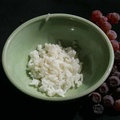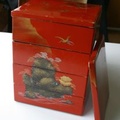>> Part 1
A temporary school was organized to make up for three months of lost time. We were scattered in small clusters across the bleachers in the grandstand. The clamor was overwhelming. Most of the time I could barely hear our teacher, Miss Nakasuji.
I shared a single geography text with four other kids. One page featured a photo of Japanese women, their hair swept up in smooth pompadours like huge dinner rolls. They smiled shyly and shaded themselves with parasols.
“This is dumb,” I blurted. “No one in Japan wears hairdos like this anymore.”
“Never mind. We’re not studying Japan,” Miss Nakasuji said dismissively.
I slammed the book on the bleacher.
A disembodied male voice crackled through a bullhorn. “Attention, students.”
Mrs. Nakasuji quickly reminded us, “It’s time for the pledge. Stand up. Hands over your heart.”
Left hand? No, it was the right. “I pledge allegiance to the flag of the United States of America and to the Republic for which it stands…”
The stadium echoed. The words vibrated up and down the bleachers.
Below me a group of high school boys stood with their hands clasped behind their backs. No one else seemed to notice. I had seen these boys before, loitering at the base of the stadium, cigarettes dangling from their lips.
“…with liberty and justice for all.”
We sat down. However, the boys below continued to stand. Now other students took notice and watched.
The boys snapped their arms in a mock military salute.
“What are they doing?”
“Showoffs.”
“They’re gutsy,” a student commented, admiration in his voice.
“…part of the Blades.”
“Blades?”
“One of the L.A. gangs.”
The boys marched away, legs moving in unison.
Their teacher did not stop them.
I fought an impulse to escape with them. Just stand and go. How hard was that? Yet I couldn’t force my bottom off the bench.
Flies buzzed around us as if we were a picnic lunch. I swished them away with my arms and legs.
“Quit kicking me!” This was Tiz, Miss Crybaby.
“I didn’t do it on purpose.”
Tiz edged away.
“Yuriko!” Miss Nakasuji snapped.
“Yes?”
“Please sit still!” That same command again.
“OK.” I nudged Tiz’s foot.
“Teacher, Yuriko’s kicking me.”
Miss Nakasuji sighed in exasperation.
I hoped she would tire of my fidgeting and punish me once again by sending me home. I’d rather be there than plastered to this hard bench, reading from a tattered book in the sweltering heat.
Life was made for moving around, running, hopping, playing Tag and Red Rover. Before the war at the annual Japanese School undoukai competition I placed second in a race and won a bronze pendant etched with two racers hand in hand. I loved that prize. My mother was at the finish line clapping. She offered me a chain from which I could hang my takara, my treasure.
On a blanket under a huge tree we ate lunch, a Japanese meal packed in jubako, lacquered stacking boxes…rice balls, lotus root, fish cakes, sweet lima beans, teriyaki chicken. What a feast. We traded anpan and mochigashi. I loved the soft pink mochi wrapped in cherry blossom leaves.
I wanted the day to last forever.
When report cards appeared I wasn’t surprised to see an “N” (“needs to improve”) checked next to “Works hard,” and “Makes good use of time.” However, I wondered why she hadn’t marked an “N” next to “Obeys cheerfully.”
All day I heard, “Yuriko, please pass this paper.”
“Yes, teacher.”
“Yuriko, please change seats with Tommy.”
“Yes, teacher.”
”Yuriko, please stop humming.”
“Yes, teacher.”
“Yuriko, please pay attention.”
“Yes, teacher.
“Yuriko, please stop talking.”
“Yes, teacher.”
I scowled. Maybe this was Miss Nakasuji’s definition of “cheerful.” I willed all my wits to keep “No!” bottled inside. Gaman.
A parent had to sign the report card. I would find my father because he would scan the card, only interested on which line to scrawl his signature. He didn’t care about my grades. He never asked about school, how I was doing. My mother, however, would mete out her silent treatment.
When I arrived home Mrs. Satomura was sitting on the steps of the room next door. I asked if she’d seen my father.
“He’s inside with my husband, but don’t disturb them right now.”
“Why not?”
“Because I said so. You think you can do anything you want. You’re such a spoiled brat.”
I felt my face flush. I bolted into our room and flung myself on a cot.
A brat? How dare she! I’d go back and swear at her. I’d stomp my feet and yell, “Dumbbell.” “Baka” “Stupid!” “Your boys are lousy brats.” I’d give her “the finger.” Maybe I’d even slap her.
But I didn’t do any of those things. A lump lodged in my throat. I gritted my teeth. I didn’t want to bawl like a baby, but I did. Not big tears, just those burning “I-hate-you” tears that oozed out despite gaman.
Then I heard my father’s voice tremble through the wall. “More.”
Mr. Satomura replied with a tumble of indistinct words.
A long silence followed.
Some time later I peered outside. Mrs. Satomura was gone so I went next door. “Dad? Mr. Satomura?” No answer. I nudged open the door. “Daddy? Mr. Satomura?”
My father and Mr. Satomura were both snoring on the same bed. I was struck by the reek of alcohol. My father stirred.
“Daddy, I need you to…”
“Go. Away.”
“I need you to sign my report card.”
“Not now,” he slurred and rolled over on his side.
In the end it was my mother who signed my card and, as expected, I got the silent treatment. This time it lasted only two days. Not that bad.
Author’s note:
This is chapter 3 from an upcoming publication titled “18286.” The watercolors, photographs, and pictures which accompany each chapter, and are an integral part of the manuscript, are not included here. I have freely used dreams and imagination to augment lapses in memory, but the episodes are true. I have researched events and dates of historical events for accuracy.
© 2010 Lily Yuriko Nakai Havey






